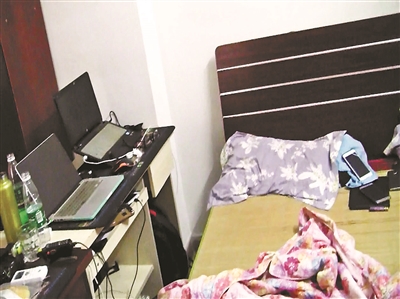Police crack illegal software profiteering case 30,000 online ride-hailing drivers use it to pick jobs


Online car-hailing drivers use a cheating software and open it at the same time as the online car-hailing client side, they can evade the rules of the online car-hailing company, pick their favorite single, and even deceive the location, turning the 10-kilometer distance into 11 kilometers, overcharging passengers.
Since the beginning of this year, more than 30,000 drivers in many parts of the country have purchased and used this cheating software, causing online car-hailing companies to lose more than 6 million yuan. On August 28, the gang that developed and sold the software was arrested by the Beijing police in Guangzhou, and five suspects have been detained. It is understood that the case of illegal profit-making specifically targeting the loopholes of online car-hailing software is the first in the country.
incident
The background display of the online car-hailing company is abnormal.
On July 29, an online ride-hailing company in Beijing reported to the cyber security corps of the Beijing Municipal Public Security Bureau that others could interfere with the data running on the company’s computer information system by developing a driver-side APP cheat, and then realize that the driver "refused the order" and "picked the order" for the distributed driving request without being restricted by the rules. Due to the relatively low price of the cheat and the maximization of driver profits, more than 30,000 drivers across the country have purchased and used it, resulting in more than 6 million yuan of economic losses for the company.
According to a person in charge of the online ride-hailing company, the company’s backstage can display the driver’s driving trajectory and order receipt at any time. For some time, the company has found that some drivers have abnormal orders. Under normal circumstances, the company distributes orders and subsidies to drivers based on factors such as the driver’s location, evaluation score, travel distance, etc. But the backstage found that some good orders should not have been given to those drivers, but they were given, or some drivers can receive good orders frequently within a day. This means that these drivers can get more benefits and defraud subsidies that should not be available.
The person in charge said that based on a fair and effective set of rules in the company’s background, passengers can use online ride-hailing software to call a car within a minute or two. If someone does not abide by the rules, it will cause losses to the company and be unfavorable to passengers. Passengers may have to wait a long time to get a car, or if they get a car but are rejected, the entire taxi ecosystem will be destroyed in the long run.
The company has been following some drivers for more than half a year, confirming the conjecture that these drivers are using cheating devices, and found that someone is selling cheating devices in a high-profile manner, so it called the police for help.
demystify
Cheating software can grab orders and refuse orders.
After receiving the alarm, investigators from the Beijing Municipal Public Security Bureau’s Internet Security Corps immediately set up a special task force to investigate. For the Internet police, this is a new type of crime, and it is the first in the country. By fully communicating with the technical staff of the company and understanding the background rules, the police have identified the principle of the fraud and identified the suspect.
The investigator of the Network Security Corps introduced that this cheat is a mobile phone client side, which is opened at the same time as the online car-hailing software. The cheat modifies and interferes with the original operating rules of the online car-hailing through programming, uploads wrong information to the server in the background of the online car-hailing, and makes the server make wrong judgments.
It is understood that the most commonly used function of the cheat is to grab and reject orders. For example, after an order comes, the driver clicks on the grab order with his finger, which is actually very passive. But with this software, set the starting point you want, you can get the order that meets your requirements through the keyword, and then the mobile phone will quickly respond to grab the order.
According to the company’s requirements, a driver cannot refuse 2 orders per day, so the driver cannot refuse the order at will. When a driver accepts an order that he is unwilling to accept, the software will fake a phenomenon, that is, the driver may accept the order but do not respond due to poor signal or other reasons. At this time, the server will think that the driver did not reject the order maliciously and will not punish the driver, and will send the order to others later.
Among other things, the software can fake the GPS location, making the server think the driver is at a location, so that the server can send the order to the driver at this point, but in fact the driver may be far away. There is also a function that is supposed to be 10 kilometers of travel, but deceive the server into 11 kilometers, overcharging passengers.
division of labor
The mastermind woos college graduates to develop
After finding out the principle of the cheat, the investigators quickly locked in the five-person gang that developed and sold the software. The leader, Pang, was originally a brother who knew the industry very well and had used software with similar functions before, so he wanted to develop his own software to make money. By chance, Pang met Xiaowei, who had just graduated from college. Xiaowei’s programming skills were very strong, so he pulled Xiaowei into the gang and developed the cheat. There were also two people in the gang, one was Jia and the other was Xiao Ai, who were responsible for sales and after-sales services. In addition, there was Liu, who was an agent and was well-known in the industry.
The gang said that if drivers want to buy the software, they can join a QQ group after paying a certain fee. In the group, gang members will send the download address of the software to the driver. After the download is successful, they also need an activation code, which needs to be paid again. After activation, the software can be used and must be updated frequently.
According to investigators, after the software was developed at the beginning of this year, it spread rapidly among driver circles. In May, the gang began a national tour, playing and promoting the software. They first went to the three northeastern provinces, and then to the provincial capitals of the country. They sold it online, and then came to the door to help install it. At present, more than 30,000 drivers across the country have purchased and used the software.
This software is divided into Apple mobile phone taxi order grabber and Apple mobile phone special car/express order grabber. There are two types of taxi order grabber: full-function order grabber and regional order grabber, both of which are 600 yuan. The function of the full-function order grabber is "custom driving straight-line distance kilometers to grab orders, custom starting point and destination keywords to grab orders, zero seconds to grab orders, three accelerators, virtual positioning"; the regional order grabber needs to select the map range on the computer, and the function is "custom kilometers to grab orders, coordinate range to grab orders, three accelerators, virtual positioning".
The gang also promised that the software would be sold permanently, and all updates would be free. In addition, the gang also sold new and unopened iPhones at the price of the iPhone’s official website, and added 800 yuan to this price to install all the company’s cheating software.
arrest
The gang was caught selling goods in Guangzhou
Investigators said that Pang had modified a BMW, and the cost of the vehicle modification and the cost of the national tour were all obtained by selling software. On August 28, the police learned that Pang was cruising to Guangzhou and that five gangs would gather in a residential building in Guangzhou, so they decided to arrest him that day.
After the investigators discussed the plan downstairs that day, they went up the stairs and guarded the door. The landlord came forward and knocked for a while before the door was opened. When the door was opened, the five gang members were still sleeping. The investigators took all of them under control on the spot. At the same time, more than 30 mobile phones and three computers involved in the case were seized, and a large number of chat records, transaction records and software information were stored on the computers involved. In addition, the police froze the gang’s bank account and initially found that the funds involved were as high as 1 million yuan.
Investigators said that Pang and others did not think their actions were a crime at first, and the crime was blatant. Afterwards, all five suspects confessed to the crime and have now been detained by the police.
The person in charge of the ride-hailing company said that any act of selling or using cheating devices is a crime, and everything in the Internet world can be traced. In the future, the ride-hailing company will still cooperate with the police confidentially to crack down on such violations of rules. In addition, drivers who violate the rules will be punished.
It is understood that since August 1, the Beijing Municipal Public Security Bureau launched a special project to combat and rectify online public security order, the Beijing police have formulated a work idea focusing on combating hacker crimes in response to the increasingly rampant situation of cyber crimes, and dispatched capable police to establish a special class to combat such crimes.
As of August 31, the Beijing police had cracked four targeted hacker crimes, detained eight people, and cracked more than 10 other cases, effectively curbing the high incidence of hacker cybercrime. And this is the first case in the country to crack the illegal profit-making case of exploiting the loopholes of online car-hailing software.
This article/Our reporter, Kuang Xiaoying